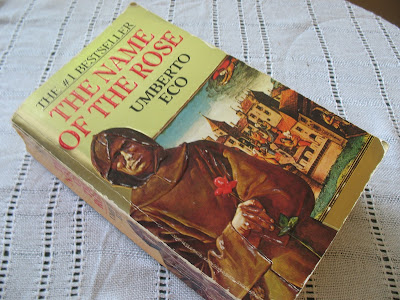Translated from the
Italian by William Weaver
The Name of the Rose is
one of the most amazing (if not the
most amazing) novels I’ve ever read. Having recently finished re-reading it, I
have to say that my amazement has not waned in the least. This is a brilliantly
intense book with so much detail, so much depth, and so much meaning, much of
which, I must admit, is probably totally lost on me.
The story at the center of The Name of the Rose is ostensibly a murder mystery, but there’s so
much going on in and around that story that it would be foolish to focus on
that aspect of the novel alone. A 14th century Benedictine abbey may
seem like a limiting setting, small in area and potential and full of stodgy
monks stewing in their own juices. The wealthy monastery that houses this entire
novel, however, becomes so much more. It becomes the stew pot for the raging
tumult in Europe during that time, which was rife with popes, bishops, heretics,
inquisitors, and emperors and Eco has left none of them out of this complex
story.
This novel is stuffed with and driven by a handful of colorful,
fanatic, decent, and indecent characters, but in the center of them all is a
most extraordinary, if inanimate, character: the Library. Yes, I feel like the
dangerous labyrinth of jealously guarded books is a character in this story. It
dominates the spirit of the abbey, seemingly torn between keeping itself hidden
and indecipherable and bursting free of its deceptive and puzzling walls to
share its knowledge with the learned world. It is the monastery’s point of pride,
but also the source of its vices and, perhaps, its ultimate downfall.
Of course, Umberto Eco is a rare genius. I can’t even begin
to describe the many layers of history, social commentary, cynicism,
compassion, faith, doubt, fact, fiction, goodness, evil and terror that come
alive in The Name of the Rose. I
freely admit that I don’t even understand them all, but that doesn’t keep me
from being both thoroughly entertained and provoked to deep thought. It’s dangerous for me to read Eco. Not only is
my perception of the world shifted at least a little bit each time I do, but I’m
also tempted to do nothing but read and re-read…and read some more.
Coming soon: The Library
at Night (again) by Alberto Manguel
A Year of Books I’ve Read Before

No comments:
Post a Comment